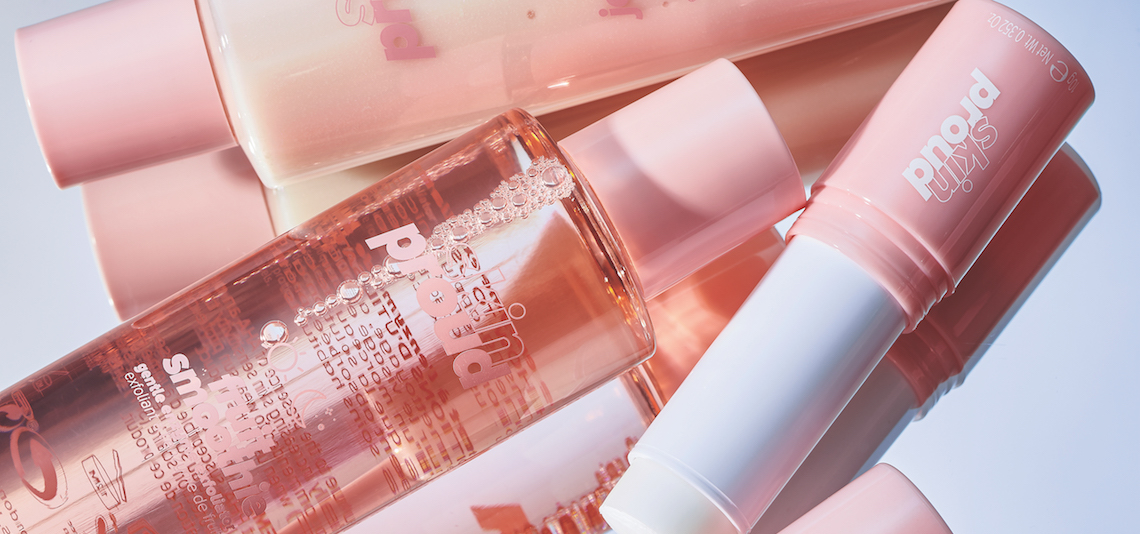Among the many social media platforms available, U.K.-based skin-care brand Skin Proud is wading into the world of Twitter.
As part of May’s mental health awareness month, Skin Proud partnered with mental health advocate Elyse Fox, founder of charity Sad Girls Club, and multidisciplinary artist Bunny Michael to create a skin positivity Twitter chatbot to promote positivity, self-care and happiness. Typically, Twitter is not regarded as a popular platform for the beauty industry. For example, major brand L’Oréal Paris USA boasts just over 500,000 followers on Twitter compared to its 9.6 million Instagram followers. There is “strong potential” for the bot to remain active past May 31, said Nora Zukauskaite, global marketing director for Skin Proud.
The bot, which was created in-house, will target any Twitter posts that use negative keywords related to skin care and skin stress. In turn, it will provide tips and advice from the two mental advocates centered on the ideas of detoxing, sleep and recharging. There is also a crisis hotline number provided for additional support from Sad Girls Club. The bot itself is tied to the Skin Proud account @IAmSkinProud. Two-year-old Skin Proud is sister brands with Ciaté London and Lottie London — all are owned by umbrella company Brand Agency London and founder Charlotte Knight. The mass brand is sold through retailers like Asos, Walmart and Urban Outfitters. Prices for products range from $11-$16.
“The only thing which can set you apart [as an indie brand] in this industry is your creativity. We’re constantly pushing the boundaries of thinking and of doing things,” said Zukauskaite. Zukauskaite, who also leads up marketing for Ciaté London and Lottie London, pointed to those brands’ entries into the metaverse, NFTs and virtual try-on through QR codes, as examples. “Beauty is a saturated category, and there are big conglomerates with celebrity endorsements. But it’s not about that. [The Twitter bot] is about disrupting the status quo, owning the conversation, being in the same realm as the big brands [and saying], ‘We’re at the same level,’ [in terms of] creativity.”
Zukauskaite said Skin Proud sought to use Twitter for its initiative because Twitter conversations happen in real-time and the original concept of Twitter was to act as a town square where brands can be part of existing community-led conversations. And although Twitter may not seem the preferred platform of choice for Skin Proud’s Gen-Z audience, compared to TikTok or YouTube, Twitter boasted in 2021 that nearly half of all tweets sent in the prior 12 months in the U.S. were from users ages 18-24.
“At Sad Girls Club, we work to create supportive digital communities for millennial and Gen-Z women and girls worldwide. Working with Skin Proud gives us yet another opportunity to shift the conversation and further destigmatize mental wellness online,” said Fox.
Twitter is still, in some ways, a bold choice. Aside from the recent drama surrounding a potential Twitter buyout by Elon Musk, Twitter has experienced problems, denouncements and complaints surrounding its impact on anxiety, as well as the presence of doxxing and harassment on the platform. Celebrities and brands alike have steered clear of the platform over the last several years. Some beauty brands like CeraVe are active due in part to the platform’s popularity among academics and medical professionals, according to Adam Kornblum, head of global digital for CeraVe at L’Oréal Group, in a previous Glossy interview.
Ad position: web_incontent_pos1
“We see this bot as a positive [contribution],” said Zukauskaite. “We’re not trying to intrude [on] the conversation, but rather [we’re trying to] share tips that people might find useful. It’s about being a part of the bigger conversation and the timely conversation, and [supporting] a better cause.”
Promoting mental health awareness can also be a tricky space for brands to navigate, given the competing interests of being authentic while also promoting products. To that end, Zukauskaite said there are no specific key performance indicators tied to the initiative aside from spreading positivity and raising awareness. However, she noted that Skin Proud does not ascribe itself to only a single cause and also has LGBTQ+ activations in June and is cruelty-free. Skin Proud compensated Fox and Michael for their participation and built the bot in-house. According to Zukauskaite, “[It’s] not the size of the budget but the creativity that will get you further.”
In addition to the Twitter bot, Skin Proud will repost its mental health tips on its Instagram, TikTok and Discord pages where it has a collective follower base of nearly 200,000. According to previous Glossy reporting, Lottie London, Ciaté London and SkinProud saw a 20% decline in year-over-year sales in 2020, due to Covid-19, but remained profitable. At the time, Knight expected a 30% year-over-year sales growth for the overall business in 2021.
“If it makes several people feel better and catches their attention and [encourages] them to spend a few extra minutes to be with themselves and find calmness, that’s all that’s that matters,” said Zukauskaite.




